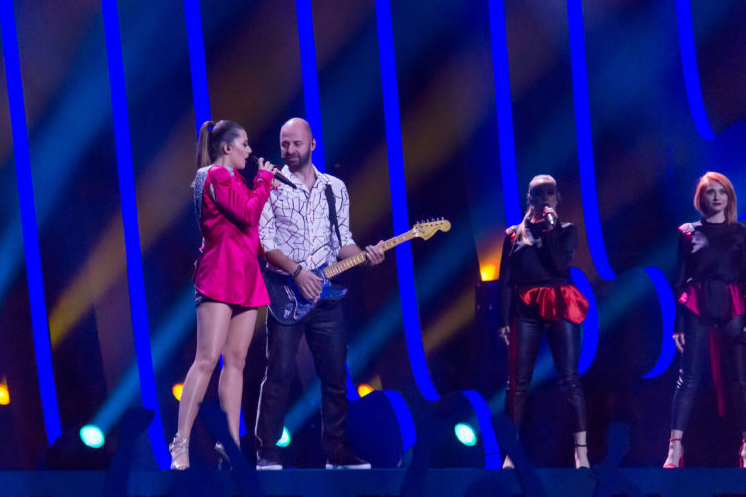The Eurovision Song Contest is back, and this time it’s taking over Basel, Switzerland. While the glittering spectacle promises to be full of glitzy performances and dramatic flair, Israel’s participation remains a divisive issue.
With the opening ceremony already underway, the stage is set for what will likely be another year of protests and public scrutiny for Israeli singer Yuval Raphael, who will represent Israel with her ballad, “New Day Will Rise.” The tensions surrounding her participation aren’t just a side note this year—they’re front and center.
A Return to Basel, but With Lingering Controversy
Basel is hosting the Eurovision Song Contest for the first time in 2025, and the city is already buzzing with excitement. As the singers from 37 countries gather in this picturesque Swiss city, the focus is on the music, the fashion, and the unforgettable performances. But for some, the annual contest has become something of a battleground for political debate.
This year, Israel’s participation is once again overshadowing the festivities. Even though the European Broadcasting Union (EBU) has rejected calls for Israel to be excluded—despite protests from former Eurovision participants, members of the European Parliament, and public broadcasters from countries like Iceland, Spain, and Ireland—tensions remain high.
While previous years saw even stronger protests, particularly in 2024 in Malmo, Sweden, this year the anti-Israel sentiment remains a potent undercurrent. Groups calling for Israel’s ouster from the competition haven’t backed down, and there’s little indication they’ll stop anytime soon.

Yuval Raphael: A Target for Protests
This year’s controversy revolves around Israel’s representative, Yuval Raphael, who is set to perform her song “New Day Will Rise” in the competition’s second semifinal on Thursday. The emotional ballad has been widely praised for its heartfelt lyrics, but Raphael’s appearance at the contest is expected to attract attention for all the wrong reasons.
Anti-Israel activists have been vocal about their opposition to Israel’s participation, and Raphael is likely to face protests and boos from the audience during her performance. Her participation has been met with resistance from various quarters, but she remains determined to represent Israel despite the criticism.
Raphael’s performance comes at a time when calls for boycotting Israel at international events have gained traction in certain parts of Europe. The pressure has been relentless, and it’s clear that Eurovision has become a platform for political expression, beyond the music itself.
But despite the protests, the EBU has made it clear that the competition will proceed as planned, with Israel’s spot firmly secured. According to reports, the EBU has rejected any proposals to bar Israel from participating this year, even though public sentiment remains divided.
Anti-Israel Sentiment in Europe: A Continuing Trend
In recent years, the Eurovision Song Contest has become more than just a celebration of pop music—it has turned into a political battleground, especially where Israel’s involvement is concerned. While some nations continue to show support for Israel’s participation, others have used the contest to voice their disapproval.
The situation has only been exacerbated by geopolitical tensions in the Middle East, where Israel’s policies often come under sharp criticism from European activists and politicians. Despite the contest being a celebration of diversity and creativity, Israel’s presence continues to stir emotions across the continent, with protests and boycotts becoming almost an annual tradition.
What’s different this year, though, is that Israel is facing resistance not just from a few vocal activists, but from a larger coalition of European broadcasters, politicians, and former Eurovision participants. These groups argue that Israel’s actions in the Middle East are incompatible with the values of the Eurovision Song Contest, and they have not hesitated to make their voices heard.
Yet, the EBU stands firm in its commitment to uphold the principles of inclusion and fairness. As it stands, there is no indication that Israel will be excluded from the event, despite the continuing protests.
The EBU’s Stance: Standing Firm on Israel’s Participation
Despite the mounting protests, the European Broadcasting Union has repeatedly stated that Israel’s participation in Eurovision 2025 will not be revoked. The EBU’s commitment to inclusivity means that each country, regardless of political or social issues, is welcome to compete in the competition.
While some European lawmakers and broadcasters have pushed for Israel’s exclusion, the EBU has emphasized that Eurovision is about celebrating music and culture, not politics. In the face of increasing calls to boycott Israel, the EBU has held its ground, choosing to focus on the artistry and entertainment value of the event rather than engaging in political disputes.
This stance has sparked both praise and criticism from different sides of the debate. Supporters of Israel’s participation argue that Eurovision is meant to be a celebration of diversity, while critics maintain that Israel’s ongoing policies in the region should disqualify it from the event.
The EBU’s decision not to engage in this political debate highlights the organization’s dedication to ensuring that Eurovision remains a platform for artistic expression, free from political interference. However, this stance has done little to quell the tensions that will likely continue throughout the competition.
What to Expect in Basel: Protests and Performances
As Eurovision officially kicks off in Basel, the city is preparing for the spectacle that the competition is known for—bright costumes, big performances, and unforgettable moments. But amidst the glitz and glamour, protests are expected to be a key feature of the week.
In particular, Yuval Raphael’s performance is expected to be met with protests and, perhaps, some boos from certain sections of the audience. However, Raphael remains determined to continue, stating that she is focused on the music and the message of hope her song conveys.
The grand final on Saturday will feature 26 acts vying for the Eurovision crown, and Raphael is expected to advance to the final. However, her journey to the top may be marred by political protests and public backlash. The question remains: will the politics of Eurovision overshadow the music this year, or will the contest be able to rise above the controversy?
